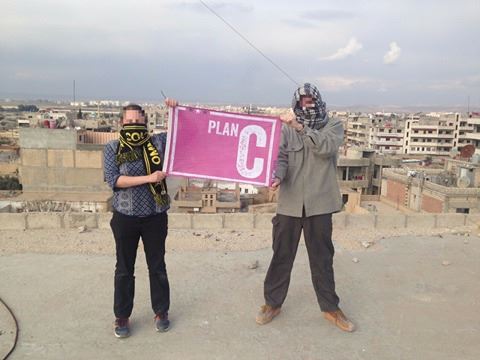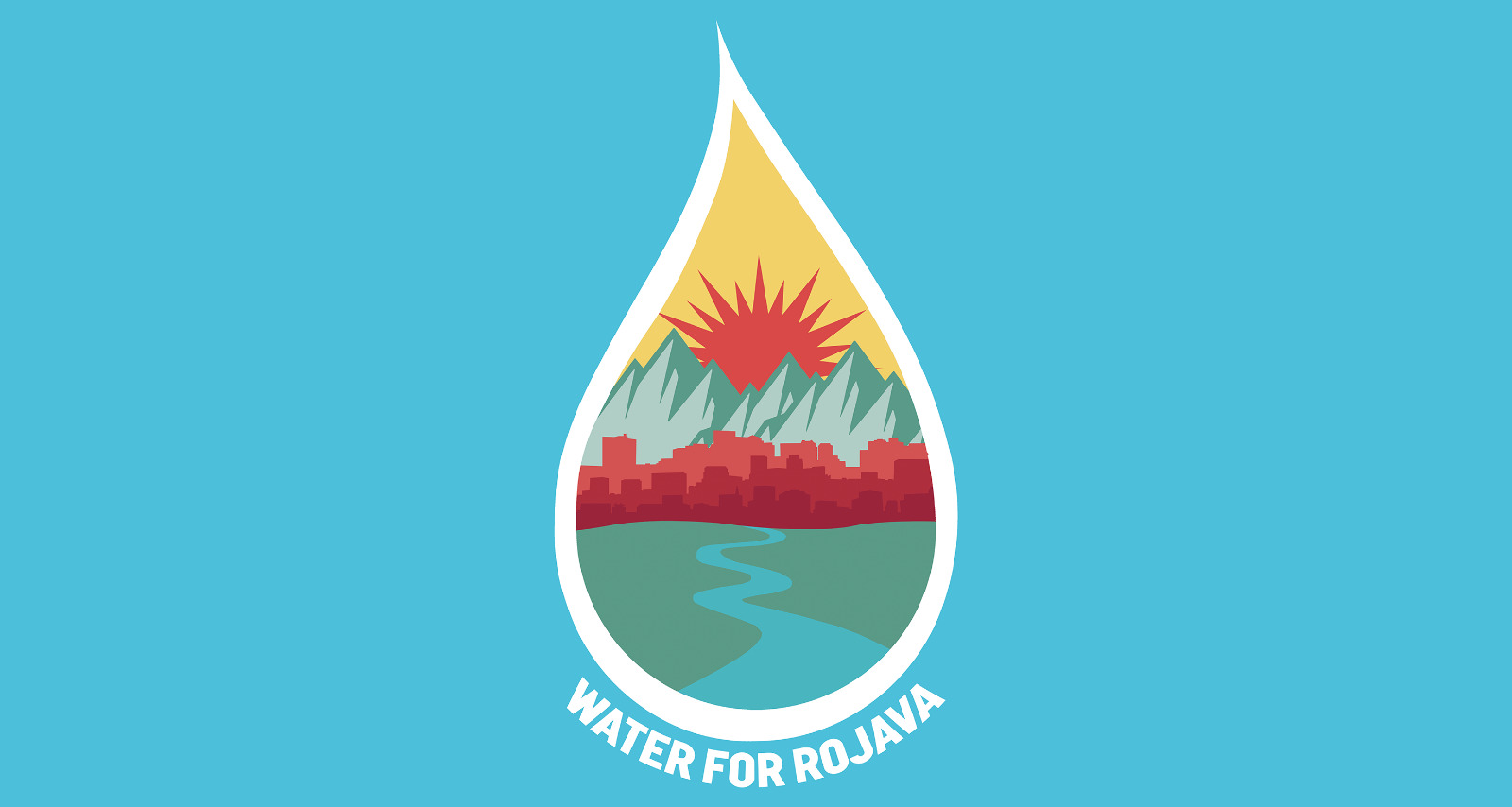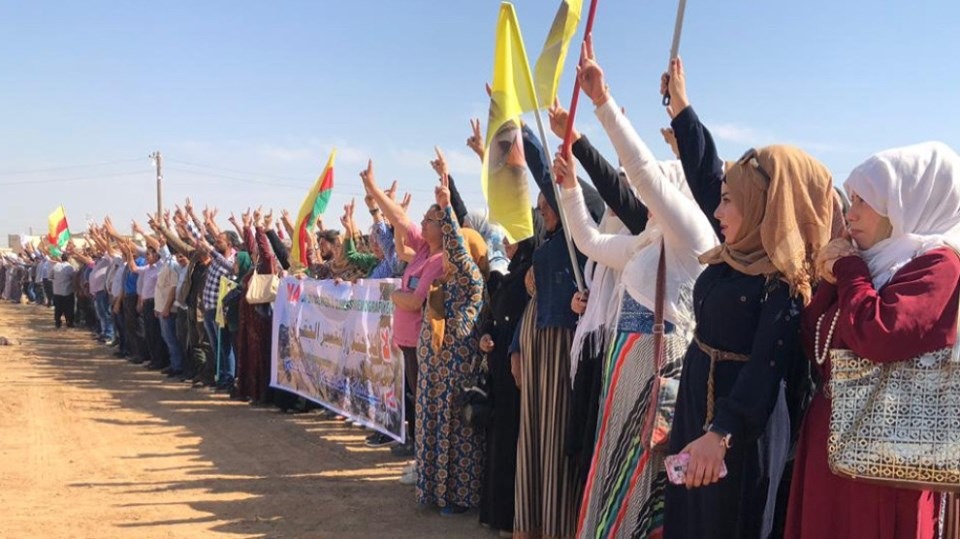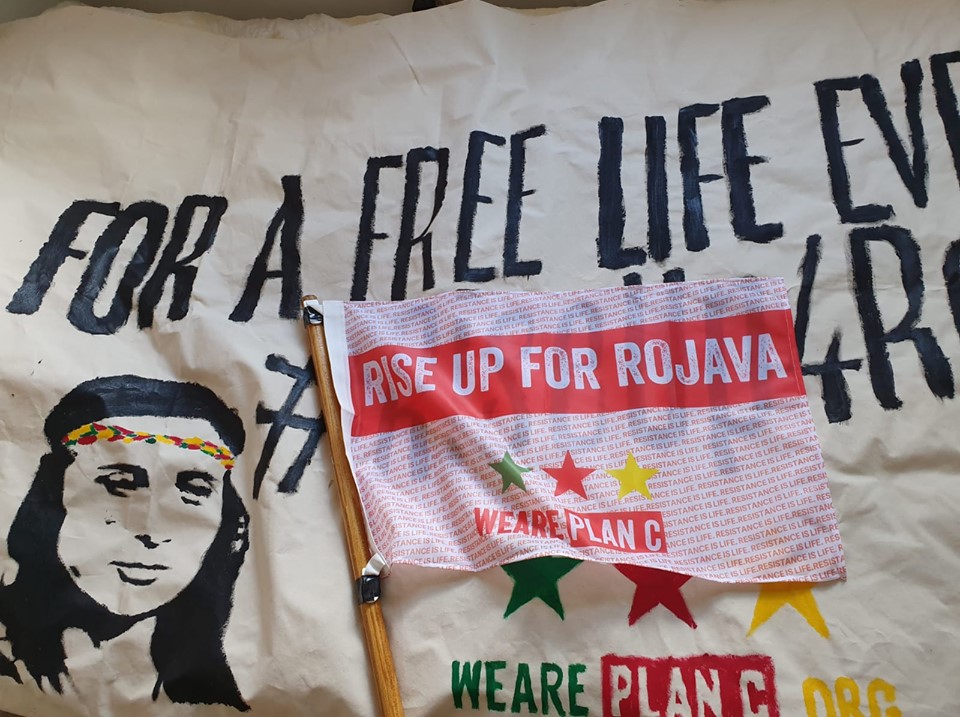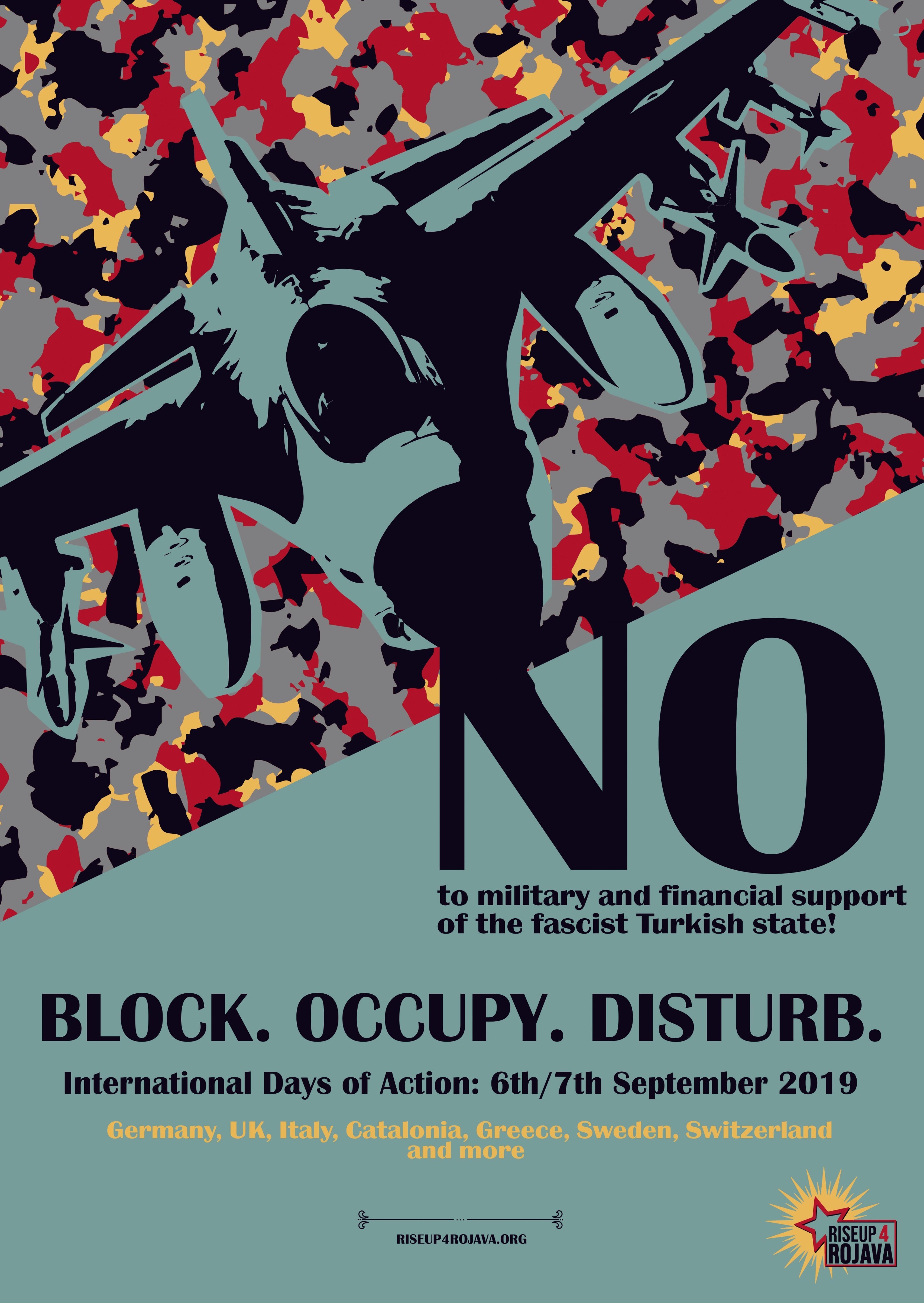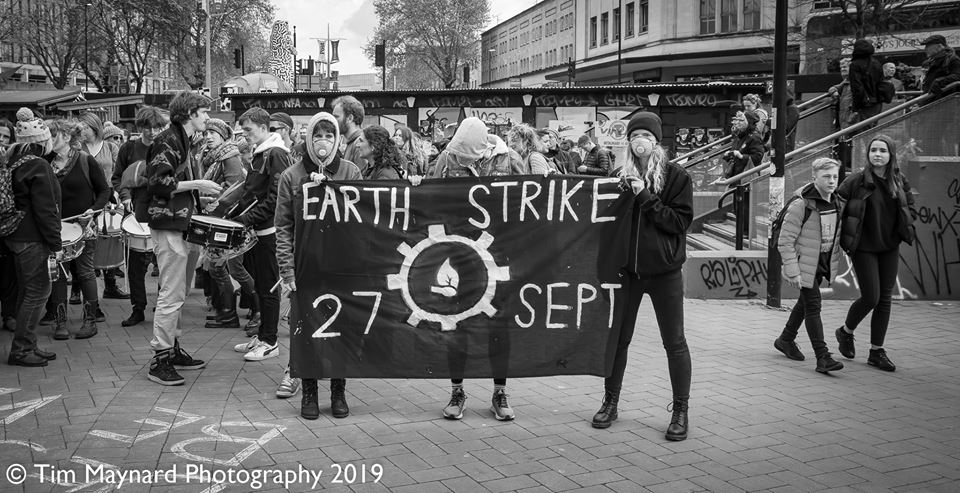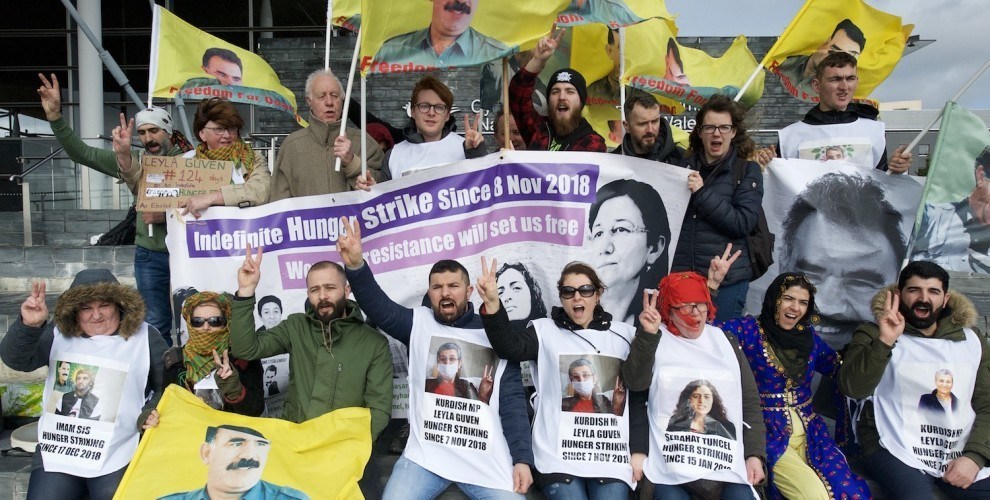In October 2016 Peter Loo travelled to Rojava* to volunteer as an English teacher and participate in work within civil society – the outcome of over 14 months of organising within the Plan C Rojava solidarity cluster. He is currently working for the SYPG campaign in Qamishlo. As well as directly offering his skills Peter has been able to visit places in Rojava and speak to many people as the future of Rojava, and Syria in general, continues to hang in the air. This interview took place late in December 2016. First published on Novara.
Hi Peter, we’ve got lots of questions about your experiences so far but perhaps you could explain a little about the history to date for some readers who might not know too many of the details.
Well, we should start by briefly talking about the origins of the revolution. Many people skip over this part but it is vital to understanding the dynamics of the whole revolution. The Democratic Union party (PYD) who led the revolution have been active in northern Syria/western Kurdistan (Rojava is the Kurmanji word for west) since 2003. Before them the Workers’ party of Kurdistan (PKK), who the PYD are affiliated to, were permitted by the regime to use the region as a base to organise against the Turkish state until they were ejected in 1998.
The first protests against [Syrian president Bashar al-] Assad started in early 2011 and by the spring the PYD had begun to focus effort into organising the Kurdish community, forming local committees and armed self-defence units (the precursors to the YPG and female YPJ forces). This was to be the social basis for the revolution. In the middle of July in 2012, as the social movement against Assad turned into a bloody military conflict involving many international powers, these self-defence forces, bolstered by PKK-trained guerrillas, evicted the regime from several towns and cities in the north. The PYD’s defence forces took control of major roads and evicted the regime forces from key infrastructure sites with very few clashes or casualties.
The uprising had a distinct geography: areas with a predominant Kurdish population where the PYD had been organising were the ones to rise up and eject the regime forces. In areas without an overwhelming Kurdish majority, Assad’s forces managed to maintain a presence. Here in Qamishlo, where an estimated 20% of the population support the regime, there was some heavy fighting but the regime managed to hold onto many of the public buildings. July 2012 marks the emergence of Rojava as a distinct force in the Syrian conflict. The cantons which were formed declared themselves to be against Assad (though arguing that he should be removed through elections not force), yet not a part of the rapidly fragmenting constellation of Syrian rebels. The relationship between Rojava and the Free Syrian Army (FSA) – the military forces initially formed by the rebels – is a complicated one and there have been examples of both co-operation and conflict between Rojava and different parts of the FSA since the beginning of the revolution.
This account of the origins of the revolution as an insurrection is contested by those more critical of the Rojava revolution and its refusal to join the wider uprising against Assad. Most publicly in the UK these critics include Robin Yassin-Kassab and Leila al-Shami, the authors of Burning Country. In this book, which only briefly touches on Rojava, the authors argue the withdrawal of Assad’s forces was “apparently co-ordinated” with the PYD, whose coming to power was a fait accompli, agreed beforehand with the regime in order to free troops up from guard duty to fight the rebels elsewhere. These two narratives (fait accompli or successful insurrection) clash and I don’t have a definite answer – perhaps things will become clearer in the next few months as the future of Rojava’s relationship with the regime becomes apparent. However the fait accompli argument doesn’t explain why there were military casualties in the initial days, nor why hostilities continue sporadically. A conspiracy doesn’t seem that likely. Rather, [it’s likely that] recognising the political reality in Rojava had changed with the insurrection, Assad renegotiated his political position with regards to this part of Syria, possibly keeping his options open in the long term.
From this beginning the revolution has expanded geographically – two of its three cantons are directly connected (Kobane and Cizire cantons), and fighting continues to connect these to Efrin canton – and also socially. A political system based around decentralisation (the confederal system) and the construction of local-level ‘communes’ has been instituted, an economic system which prioritises co-operatives and provides for the people’s basic needs is in place, and a massive shift in gender relations is under way. This is one of the most exciting political struggles being undertaken in the world today both in terms of its scale and scope, made all the more impressive given the conflict continuing to unfold in Syria and the hostility it faces from neighbouring countries.
We’ll come back to the revolution’s relationship with the regime later on. So the revolution began as a PYD-led movement, primarily supported by Kurds?
Exactly. After what we could call the insurrectionary phase of the revolution – removing the regime from effective control – the next phase was one of political consolidation and the implementation of a political programme. This programme has three central planks: a system of grassroots democracy (which exists in a relationship with formal political parties and some form of representative system) which goes under the name of democratic confederalism, a women’s revolution, and an ecological programme (by far the least developed aspect at the moment). Building support for this programme beyond both the PYD and the Kurdish community were the immediate tasks of the revolution.
Many smaller political parties are now an active part of the revolution, working together beneath the umbrella of TEV-DEM (Movement for a Democratic Society). But obviously not everyone is supportive of what is happening. ENKS, a coalition of 16 parties dominated by Massoud Barzani, president of the Kurdish regional government (KRG) of Iraq, has been a vocal opponent of many of the developments here in Rojava. Barzani does not share the political vision of the PYD, modelling KRG on oil states like Dubai, and is currently implementing a full embargo on Rojava alongside his ally Turkey which is causing all kinds of problems. Because of these tensions Carl Drott from the University of Oxford has argued that “sometimes it seems that the only consistent policy of the KCN [ENKS] is to oppose anything that the PYD does.”
More importantly the revolution has prioritised gaining the trust and support of all the communities here in Rojava. These communities (Arab, Syriac, Chechen, Armenian, Turkmen, etc.) are participating in increasing numbers as time goes on and they see the ideas of the revolution – and its benefits – put into practice as well as seeing that the regime isn’t coming back. The reasons for supporting the revolution vary from the more politically motivated, such as a desire for a free Kurdistan or a belief in the politics of [the PKK’s imprisoned leader Abdullah] Öcalan and his vision of confederalism, to the less abstract desire for peace, security and the provision of basic services which the revolution is providing. The YPG and YPJ are pretty much universally loved here and this support has extended to the military alliance – the Syrian Democratic Forces (SDF) – they have built with other progressive militias (of different ethnicities) in the region.
The revolution began from within the Kurdish community and work to build support for it within other communities is a central priority. This includes working with the thousands of Arab refugees fleeing the conflict in the rest of Syria who are being blocked from travelling to Europe by the Turkish state. Part of my work with TEV-DEM here centres around building this support across communities. The Syriac community, for example, is starkly divided between the regime and revolution, with each faction possessing its own military and police units. Passing through the Syriac neighbourhoods these division are quite clear, one street full of portraits of Assad and the regime’s flag, the next containing pro-revolution checkpoints with revolutionary slogans on the walls.
Let’s tackle the thorny question of the relationship between the regime and the PYD. In short, what’s going on?
Well, as I said earlier, the revolution didn’t kick the regime out everywhere. Here in Qamishlo, the regime still has a presence. When Aleppo was ‘liberated’ recently for example, there were loud, noisy celebrations for Assad’s victory in some neighbourhoods and the regime still pays the salaries of some civil servants like teachers. Occasionally clashes break out in the cities where the regime still has a presence such as Qamishlo and Hasseke.
As I said earlier the revolution here has constituted itself as a force independent of the wider rebel movement against Assad (itself very diverse). It has relied on the support of international social movements, progressive political parties, and also most controversially on the support of large states such as the USA and (at times) Russia. These have to some extent prevented Assad or, more likely at the moment, the Turkish state from outright crushing them, but the situation is still perilous. With regards to the regime, it’s unclear at the moment how the regime will orientate itself towards Rojava and vice-versa. At the moment, neither side has the outright military strength to easily defeat the other. With the defeat of the rebels basically being assured with the re-occupation of Aleppo this might all change. For example, the YPG and YPJ in the large Kurdish neighbourhood of Aleppo, Sheiq Maqsoud, who defended it from rebel attacks (and also aided Assad’s forces at some points in the fighting) have now pulled out, only leaving Asayish (armed police) in the neighbourhood.
This ‘relationship’ with the regime has been criticised by many. At the start of the Syrian uprising the potential for a broader alliance between Kurds and Arabs seemed possible but failed for a variety of reasons. These include a latent Arab chauvinism, a by-product of decades of colonial rule in Rojava by the regime which was one factor in the unwillingness of both the regime and the rebels to see Kurdish autonomy established. The rise to pre-eminence of Islamist forces on the rebel side also blocked a wide-scale alliance between the Rojava revolution and the rebels. Alliances have been made with forces in the regions that make up the cantons, the SDF for example, but a broad alliance with the larger factions on the rebel side did not come about. This missed alliance, if it was ever possible, has probably significantly shaped the outcome of the rest of the conflict.
We have seen a rapid expansion of the Rojava cantons, particularly into areas with a sizeable Arab population. Could you tell us about your experiences of how the different ethnic groups are accommodated into the revolution, and how it has been received?
Since 2015 the areas controlled by the cantons have expanded massively through their offensives against Isis. It’s undeniable that one reason for this is to build a continuous, connected system of cantons. These offensives, by a primarily Kurdish military into primarily Arab areas, have thrown up some problems. I had the opportunity to visit the front at Salouk in December. As the Raqqa offensive pushed the front lines further forward people were being allowed to return to their villages. In the main the villagers I met seemed broadly supportive of the SDF forces they came into contact with. However, not all the villagers support what is happening – many, we were told, had been or still were supporters of Isis. We visited one Tabur (military unit) which had been the victim of a suicide attack earlier in the year; the attacker was a frequent visitor from the village next door.
As the area controlled by the confederal system has expanded, changes have taken place to accommodate the increasing numbers of non-Kurdish participants. I’ve mentioned the SDF as a multi-ethnic military coalition, which marked a positive step forward for the revolution. The current official name of the region, the Democratic Federal System of Northern Syria, is an indication of the multi-ethnic project the revolution is trying to build. We saw one of the co-chairs of the confederal system, Mansur Salem, who is a Syrian arab, speak a while back and he was stressing how building this multi-ethnic support is a key political challenge for the revolution.
To what extent is the ideology of the revolution in Rojava being taken up by ordinary people?
Visitors arriving in Rojava expecting some kind of transcendental revolutionary experience will be disappointed. Given the amazing work that is happening, and all the great media being produced for western audiences this isn’t surprising, but beyond the front the way the revolution is manifesting itself can often be quite subtle or even not as developed as one might expect or hope.
I’ve already mentioned the fact that spreading the values of the revolution into other communities is a work in progress. As another example, whilst the higher levels of the confederal system, especially in cities, are well developed, the lowest level, the commune – a neighbourhood level institution in which the most direct participation in political assemblies and politically-themed committees takes place – is not as widespread as one might think from the outside. The reasons for this come back to the origins and dynamics of the insurrectionary phase of the revolution as discussed earlier. Counterintuitively, we have the higher levels of this political system actively trying to expand the grassroots level of political participation. Lots of work is taking place to expand the numbers of communes numerically and geographically. It requires finding physical resources and educating people in the local community about the values of the revolution and the way the (sometimes complicated) systems work here. But perhaps the most visible element of the revolution is the role of women in society here.
That was going to be my next question. The image often projected of the revolution emphasises women’s liberation and the role of the YPJ in leading the call to change gender relations. How much does this impact on daily life in Rojava, and is it really such a fundamental part of the movement?
A criticism from the left in Europe, as exemplified in a recent article by Gilles Dauvé, is that the women’s revolution in Rojava is limited to the women in the YPJ. If it were then Rojava could not be seen to be having a women’s revolution. After all, the Israeli state conscripts female soldiers and [Muammar] Gaddafi was famous for having female bodyguards. History is littered with examples of women playing a significant role in social struggles or military conflicts, only to be returned to subservient social positions at the ending of hostilities. But this isn’t where the women’s revolution stops here in Rojava. Neither does it stop at the point of ensuring 40% women’s representation in all committees and an equality of speaking roles (alone a step beyond most western states).
Underpinning all these clearly visible outcomes is the slow, patient development of the women’s political movement: political education for women to develop their skills and build the confidence of future organisers, forms of (re)education and intervention against abusive men, the activity of women’s committees at all levels of the confederal system, and the tireless work of the Kongreya Star (star congress) – the organised expression of the women’s movement here.
Once again, this isn’t a problem-free process; these changes are being built upon a hugely conservative society where violence against women, honour killings, forced marriage, an incredibly huge pay differential, as well as the more humdrum features of patriarchy were all extremely common before the revolution. The movement is working hard to bring everyone with them, to be firm and take immediate action where needed or to take a more long-term approach where this is more effective.
Like everything here, it shares many features with western movements but retains many differences. The political underpinnings of the women’s movement here are collectively called Jineology, which means the science of women. Öcalan is, unsurprisingly, a key jineological theorist and has laid out a broad argument about the historical roots of patriarchy which overcame a peaceful matriarchal society. Capitalism is seen as inherently patriarchal and Öcalan, who is once again the key reference point for the movement, argues “the need to reverse the role of man is of revolutionary importance.”
But some parts of this theory will be more problematic for some feminists in the west. For example, the Jineological approach to gender seems to be an essentialist one where definite characteristics are assigned to the genders. Queer feminists will find this ideology quite challenging. The politics of sexuality are also quite different than in the west, for cadre sexual relations are pretty much forbidden and in the rest of society there is a strong emphasis on abstinence until marriage. In many interviews when queer sexuality is raised the standard answer seems to be something along the lines of ‘we’ve never met a gay person in Rojava before’. However this is something which will hopefully be addressed as time goes on, and I’ve heard reports of public lectures on LGBT politics taking place in some areas.
That’s a good point about Jineology not mapping onto western feminism directly. Could this be said about Apoist movements in general?
Yeah, definitely. Lots of debates about the PKK built on answering the question ‘are they an anarchist organisation?’ have gone around in circles because they have failed to actually analyse the movement itself. In the same way the PKK was never a straightforward Marxist-Leninist organisation historically, it isn’t an anarchist movement today. The PKK and its sister organisations self-define as ‘Apoist’ – a movement built around Abdullah Öcalan and his, well, quite eclectic work. The movements based on his political vision are contradictory, especially since the development of the ‘new paradigm’ since Öcalan’s arrest in 1999. This paradigm significantly changed many parts of the PKK’s political vision. Although the PKK has now formally renounced the desire for an independent Kurdish state and replaced it with its model of democratic confederalism, it is still a hierarchical movement with strict discipline for cadre and a cult of personality around Öcalan himself. Its conception of revolution doesn’t map onto those conceptions held by classical revolutionary movements, being:
“…neither the anarchist idea of abolishing the whole state immediately, nor the communist idea of taking over the whole state immediately. Over time we will organise alternatives to each part of the state run by the people, and when they succeed, that part of the state dissolves.”
Quite importantly its critique of capitalism, or capitalist modernity in its own terminology, whilst quite opaque (an opacity which isn’t helped by the lack of movement works translated into English) certainly isn’t as fundamental as those coming from the Marxist tradition. Whilst the Apoist movement corresponds with many of the values of socialist and anarchist traditions it is something distinct and different.
There was an article by two other international volunteers who self-define as anarchists on the Plan C website a short while ago. The article makes some useful and important points about the complicated practicalities of showing solidarity here and for that it should definitely be read. They make the (uncontroversial) point that working in Rojava is not neutral. The choices of who and how we work with here will strengthen some groups, individuals and dynamics rather than others, and we need to be aware of this.
I read this as making the implicit argument common to many on the anti-authoritarian left to support the people or the social movements rather than organised parties. A particular problem with that perspective here is that the Apoist movement has transcended the boundaries of its political parties and is also a mass social movement with elements of self-organisation beyond the parties. I’d argue that the revolutionary left needs to be supporting the PYD and Apoist movements across the Middle East rather than some loosely defined, potentially fictitious unaligned ‘people’. They are a very large, possibly the largest, progressive force in the Middle East and a large part of their politics resonate strongly with our own. Demonstrating a serious commitment to real solidarity work, which once it moves beyond writing articles starts to become very challenging, helps to build the platform from which to engage in discussion with these movements. There are parts of the Apoist vision which I’d love to critically debate with them (for instance definitions and critiques of capitalism) but this will probably only happen meaningfully when one can demonstrate a track record of sorts.
Going back to the communes, how important are they?
At the local level they are important for solving small problems, highlighting big ones, and function as the most local transmission belt of the ideas of the revolution. As well as running the local meetings and committees, the lower levels of the system serve as centres to mobilise people for self-defence or for demonstrations and rallies. When we go to political events we usually leave in large convoys of buses from our neighbourhood’s Mala Gel (People’s House – basically a social centre) and when we organise events the local communes are a vital resource for directly connecting with people. I haven’t seen enough of this quite complex system to judge to what extent the ideas from the base of this system are listened to higher up the federal system through the various elected delegates and thematic committees.
It’s quite funny, I met a European Marxist-Leninist here who was convinced the anarchists had got the entire revolution wrong and that the communes had a very peripheral role in what was going on. For him, the revolution was dominated by the PYD with the YPG and YPJ providing the muscle behind it. When he met one of the international Marxist-Leninist parties here doing consistent community work promoting and actually setting up communes his whole attitude completely changed. Perhaps some on the left are a bit optimistic about how developed the commune system is but it definitely exists and is growing, we just shouldn’t confuse our desires with reality.
The Economy Question: One of the most important questions for many on the left is what kind of economy is being built?
Northern Syria was historically deliberately underdeveloped by the Syrian regime and treated like an internal colony. Arab settlers were encouraged to move into the region and alongside the exploitation of oil reserves found in the area, the other main sector, agricultural production, was strictly managed. What is now Efrin canton had its many forests replaced with olive plantations whilst in the 1970s the regime spread the rumour that a particularly vicious tomato blight was spreading from Turkey in order to encourage the conversion of agricultural production in Cizire canton completely to wheat. In winter, driving through the endless empty fields which make up the countryside in Cizire canton is quite a bleak experience. Efforts are now underway to diversify agricultural production for both ecological and economic reasons.
So the revolution did not inherit much in the way of large scale means of production. The few large productive sites that exist have been socialised. I think these are a concrete factory, the oil wells, and, since the Manbij campaign, the Tishrin dam. Here in Qamishlo there are about 60 ‘factories’ with a maximum size of 20 employees. Some of these are private initiatives, some run as co-operatives. The commercial and logistical side of life in Rojava is also on the small scale. When the regime was evicted there was little in the way of large scale logistics systems – transport systems, or the integrated logistics systems large supermarket chains possess – which could be socialised. The tiny rail system is out of commission and the regime holds the airport in Qamishlo, which only hosts an infrequent internal route to Damascus.
In a great interview by Janet Biehl, the adviser for economic development in Cizire canton discusses the ‘three economies’ functioning in parallel in Rojava. You can read about it yourself but in short these are the ‘war economy’, the ‘open economy’ (i.e. the private economy) and the ‘social economy’. At the moment the war economy – subsidised bread and oil for example – dominates with the social economy of co-operatives being pointed out as a future hope. Obviously the danger is if/when the embargo is lifted and private investment is allowed in – especially for expensive infrastructure like oil refineries and heavy industry – that the social economy is completely outcompeted.
I wouldn’t want to venture a prediction about the future of the economy here, though the future challenges seem quite clear, but I can say it’s disappointing that some on the left aren’t supporting what is happening here because of the persistence of private property, commodity production and the wage relation. This is a kind of ‘all or nothing’ purism which often comes from such an abstract place, seemingly removed from an acknowledgement of the difficulties of actual social change. No revolution so far has managed to abolish capitalist relations – let alone in the space of a few years, during an international proxy war, whilst also under embargo! Whilst the Apoist critique of capitalist modernity is certainly not a Marxist one, here in Rojava its economic strategy is broadly a progressive one – albeit with question marks over the future – which deserves our solidarity.
To withhold support because capitalism will still function in some form for the foreseeable future seems short-sighted. It’s interesting that we often support non-communist social struggles right up to the point that they attain the ability to significantly change the world, at which point many of us withdraw our support. We need to take a longer term view of social change which recognises it as a contradictory and complicated process. Just because the revolution here isn’t immediately implementing communism doesn’t mean we shouldn’t support it.
What is the dominant political make-up of international volunteers? What kind of expectations do they come with, and in what ways are those confirmed or subverted?
In general, the people who arrive here are a mixture of the starry eyed and those expecting something a bit more realistic. At one point, based on internet coverage alone, it seemed as if the majority of volunteers were adventurers, well-meaning liberals, or even more right-wing people just here to fight Isis. But whilst this might have been the case at one point it certainly isn’t now. The YPG has noticed the problematic views and behaviours of some of its volunteers and has started to be more selective when it comes to who is volunteering.
Unsurprisingly, there are many volunteers from the Kurdish diaspora but beyond this the majority of volunteers I’ve met or heard about here are leftists. There is a relatively large presence of Turkish comrades from Marxist-Leninist and Maoist organisations for example. The other volunteers here are mainly from Europe and north America, and the majority are in military units. This includes a dedicated international Tabur – the International Freedom Battalion – people at home have probably seen some of the great pictures from their English-speaking ‘Bob Crow Brigade’.
Due to language barriers, and the difficulties of travelling here and finding a placement where one can be useful, there aren’t that many international volunteers in civil society. Hopefully this will get easier as time goes on. At the moment if people want to volunteer here they should think about what skills they have or can get before they travel. For example, if people are interested then training up to be an ESL (English as a secondary language) teacher is a great way of being useful here as the demand for lessons is very high.
What do you think the presence of international volunteers adds to the movement?
Sometimes specific skills which are in high demand here, medical staff for instance. If not, at the very least volunteers work as a link between Rojava and the rest of the world. The people here know they aren’t alone and the rest of the world gets to find out a little more about what is happening. This is obviously a big responsibility for those with the ability to report back and portray an entire revolution based on their experiences. Those of us doing this need to try to be honest about what we’ve seen, what we think, and the limits of our personal experience.
It’s not surprising but it is disappointing to see criticisms of the majority of volunteers as ‘orientalist adventurers’, ‘closet islamophobes’, or ‘fantasists with a hero complex’ which have arisen in some parts of the left. Whilst a few people do fit this bill, most volunteers – especially politically active comrades who have responded to calls to volunteer – aren’t like this at all. The YPG is also now taking steps to filter those kinds of volunteers out. It’s quite astonishing how even what I’d call an uncontroversial historical value of the communist movement – internationalism – is coming under fire from those who also see themselves as part of the left. It feels like there are more left volunteers from pre-existing structures here now, or perhaps they are just using media channels more effectively. Either way, hammering home the point that this is a progressive struggle which is demanding the support of the international left and which sees itself as part of an international movement is massively important and is a political task we can all be involved with.
What do you think has been the most significant impact of the revolution so far?
For the people of the region the revolution has liberated them from the domination of the Assad regime and Isis. It has also made massive progress in terms of women’s liberation and direct democracy. Internationally the revolution has given a massive boost to the struggles north of the border in Bakur and Turkey and to revolutionaries further afield. Although we need to be cautious, there are many lessons we can learn from this revolution. At the very least Rojava serves as a reminder that revolution is always a possibility where revolutionaries are organised, committed and prepared to risk their lives.
Any final comments?
The revolution here does not map onto the perfect fantasy of some revolutionaries in the west. It wasn’t the spontaneous uprising of the overwhelming majority of the people, they haven’t abolished the state (if that is ever possible) or capitalism, and there are still problems to be solved. Despite the fact that this isn’t full communism right here and right now, this revolution needs to be applauded and supported. Like all revolutions, this one has not emerged fully formed but is being built on the fly in the face of much opposition. Unlike many revolutions this one is quite hard to define: labels like ‘anarchist’ or ‘stateless revolution’ obscure more than they reveal. What we do know is that this revolution is pushing forward forms of popular democracy, women’s liberation and some form of solidarity economy. Life in Rojava is better for more people than most parts of the Middle East.
For those afraid of revolutionaries having real power to make change rather than maintaining ‘resistance’ forever, I’d like to quote Murray Bookchin (whose influence on the struggle here is definitely overstated in certain quarters).:
“Anarchists may call for the abolition of the state, but coercion of some kind will be necessary to prevent the bourgeois state from returning in full force with unbridled terror. For a libertarian organisation to eschew, out of misplaced fear of creating a ‘state’, taking power when it can do so with the support of the revolutionary masses is confusion at best and a total failure of nerve at worst.”
Those taking an ultra-left position on Rojava, and rejecting it out of hand, show us more about the weaknesses of their own politics than of the revolution taking place here. A real revolution is a mass of contradictions which must be fought through. That the revolution is doing that here without resorting to the dictatorship of one political party makes this a particularly important revolution for the libertarian left to be supporting.
There are more ways for the left to express solidarity with Rojava, and the wider struggle it is part of here in the region, than writing articles or sharing things on Facebook. Getting information out about what is happening here is important of course, but the obligations for political organisations who support the revolution here, and who have the capacity, must be much higher. For example in the UK Plan C’s Rojava solidarity cluster works with Kurdish-led structures organising discussions and demonstrations, has raised money for things like a school bus and medical supplies, and is now sending volunteers for civil work.
There are a few hardworking Kurdish solidarity groups in the UK also doing great work. When compared to long-running solidarity campaigns, like the Palestinian solidarity campaigns for instance, Kurdish solidarity campaigns are still in their infancy in the UK. The massive intensification of Turkey’s counterrevolutionary role both within its state borders and beyond, potentially spilling into Iraq this year, make this solidarity even more important. Effective national solidarity structures need to be established or joined, and federated together internationally. It’s a bit cliched but we can’t forget the slogan ‘solidarity isn’t a word, it’s a weapon’.
Peter Loo is a member of Plan C and is active in its Rojava solidarity cluster. His statement is here. His other most recent report can be read here.
* ‘Rojava’ is used instead of the Democratic Federal System of Northern Syria – the area’s official title – as both a shorthand and as the name many in the west are more familiar with.
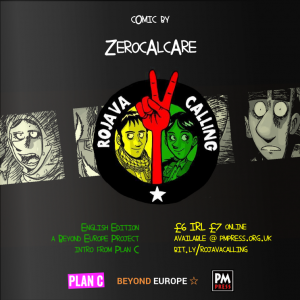
Liked this? ‘Kobane Calling’ is our brand new comic. Get your copy now! All proceeds to Rojava. bit.ly/kobanecalling



